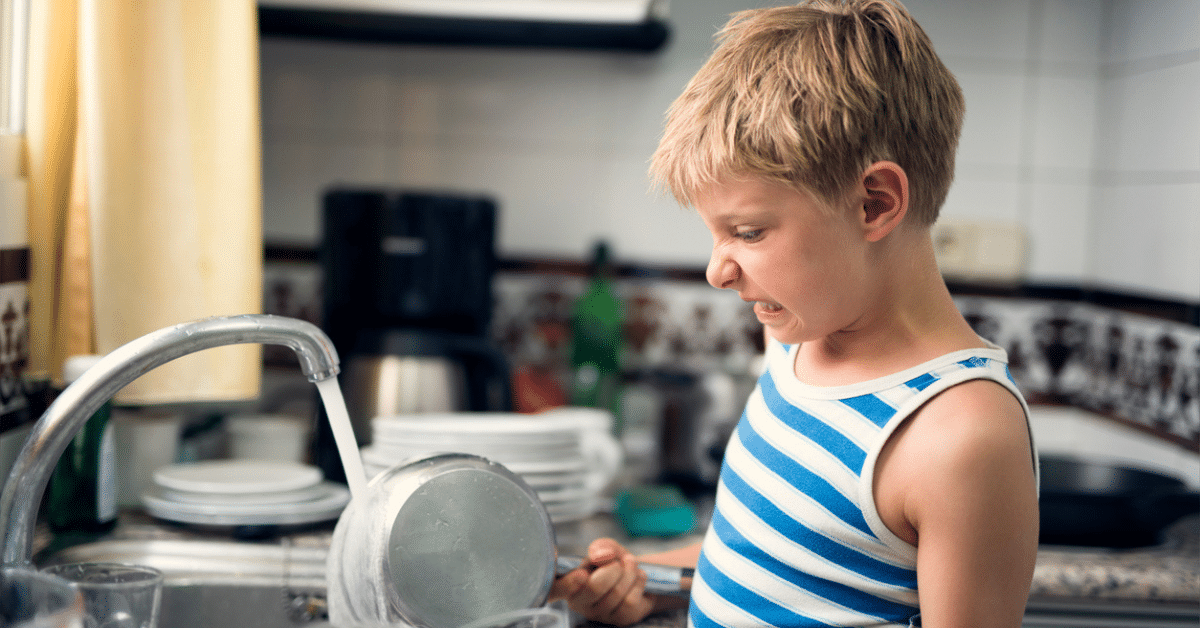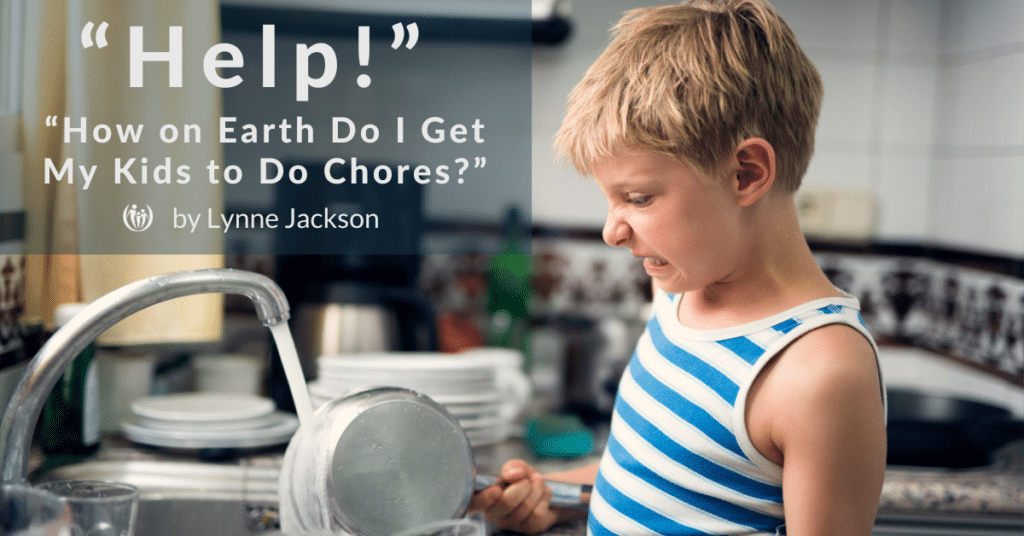
“Help! How on Earth Do I Get My Kids to Do Chores?”
Take advantage of brain chemistry!

You want your kids to do chores because you value teaching them responsibility. (And you could probably also use a little more help around the house!)
You’ve communicated why kids should do chores. Maybe you’ve even set up systems of rewards and consequences around chores. So why are the dishes still in the sink waiting to be loaded into the dishwasher? How on earth do you get kids to do chores? That’s the question so many parents ask.
Why is it so hard to get kids to do chores?
The activities that distract kids from chores get more exciting all the time! Between the lure of screens and the frenetic pace of life, mundane tasks can fall between the cracks. It’s no wonder parents come to us wanting to know how to get kids to do chores. Inspiring kids to want to do chores isn’t getting any easier.
Let go of “lazy kid” vs “helpful kid” labels
In our role as parent coaches and educators, we often hear that one child in the home struggles much more than the others, and trying to get that child to do chores can even trigger an enormous outburst of anger. These resistant kids can become increasingly aware of any comparisons between themselves and their favored siblings (in their perception), and discouragement can settle in.
Our decades of helping parents have made it clear: getting unstuck from unhelpful patterns like this starts with an honest look at: “What’s going on in me?” and “What’s going on in my child? What’s it like to be them?”
You may notice your anxiety rising as you work harder to get kids to do chores. “Chores weren’t such a problem when I was a kid. We just did what we were supposed to. Why can’t I make this happen?” Or “What’s wrong with my child?” You may even begin to believe you’re an inept parent or your child is lazy, selfish, or entitled. But engaging with anxiety, shame, or judgments is a surefire way to keep everyone stuck.
Even the phrase “get my kids to do chores” can be an unhelpful way to frame this challenge. When was the last time you felt encouraged or empowered by someone trying to “get you to do something” you didn’t want to do?
What if you ditched the pressure of that phrase and reminded yourself of the grace-filled truth that “God understands how hard this is and will partner with me as I work to grow valuable responsibility in my kids.” Phew. You’re not alone. There’s so much grace in this messy journey!
God’s “come-alongside help” is with you every step of the way.
Your chore-resisting child might struggle with low dopamine
Recent brain science helps us understand more clearly that the kids who struggle the most with chores usually don’t set out to be irresponsible, defiant, or disobedient. Instead, they often have lower levels of the neurotransmitter chemical called dopamine. This difference in brain function predisposes them to more intensely chase the pleasurable distractions that provide a dopamine burst. The discomfort of their lack of this chemical is what’s often behind their distraction, and when you call them back to routine chores, they protest, “I don’t wanna do it!”
So, how can you motivate kids to do chores?
It’s tempting to be more demanding and firm about rules and consequences. But we’ve found that this isn’t helpful with kids lacking dopamine. It actually tends to stress kids more, and as we discussed in our post, “Are We Dealing Drugs to Our Children?,” stress depletes dopamine. Stressed kids may do any number of things to get their chemical “fix.”
It also isn’t helpful to simply brush off expectations for kids with low dopamine. Your inclination to set clear parameters and high expectations (through a just-right challenge) is likely just what they need. But it helps them to see your compassion and understanding and that you’re being intentional about making these tasks less stressful for them.
God designed us to work hard and feel good about it. And it is normal and natural to seek what we consider pleasurable and avoid what we perceive as pain.
Given that truth, how can you motivate kids to work hard and do chores?
Teach kids to value accomplishment and celebrate it!
Christopher Bergland is an endurance athlete, coach, and author. He states that the secret is to “view struggle and perseverance as a doorway to pleasure” by feeling good about accomplishing something every day.
If we don’t accomplish something every day, it drains our dopamine levels. Bergland offers hope for parents and kids, “Learning and conditioning yourself to self-administer this ‘reward molecule’ [dopamine] every day can turn anyone into a go-getter.” He’s essentially saying that a child must consciously acknowledge (celebrate!) the success of achieving a goal in order to release the dopamine that strengthens perseverance. If you skip that celebration step, there will likely be little change in the brain.
Some simple ideas to turn a chore-avoider into a go-getter
Help your child value perseverance
- Share stories: Kids love to hear stories from their parents’ lives. Share examples of times when you’ve persevered and felt proud of your accomplishment, and times when you didn’t! What did you learn? (You can also Google “stories that demonstrate perseverance”; there are many for all age levels!)
- Share scripture: Galatians 6:9 says, “Let us not become weary in doing good, for at the proper time we will reap a harvest if we do not give up.” You can ask your kids, “What do you think that means? What is a ‘harvest’?”
- Highlight their success: What are examples of times your child has persevered at something important to them (even if it wasn’t important to you 😉), and what was the result?
- Teach kids a “growth mindset.” A child’s brain grows the most when things are difficult, just like how they build muscles by pedaling up a hill, not coasting down a hill! A book we recommend for ages 5 to 9 is Your Fantastic Elastic Brain.
- Teach kids the value of service: When you serve a child, talk about how good it can feel to serve (see Acts 20:35) and to be served. How does it impact relationships? You can wait for times when you see a child serving or helping another and share this verse: “Each of you should use whatever gift you have received to serve others, as faithful stewards of God’s grace in its various forms” 1 Peter 4:10.
*Growth mindset is a term that was initially coined by Child Psychologist Carol Dweck and popularized by numerous authors. Her work most closely informs our use of the term.
Set kids up for success with chores
- Make tasks shorter to be a “just-right challenge.” Help your child break overwhelming chores into more manageable tasks that can each provide a mini-dopamine burst from a sense of accomplishment. Or ask kids to help with small, more frequent tasks. Researchers studied Indigenous families to discover how they raise such eager-to-help kids. They found that parents invited kids to help with small tasks an average of three times an hour!
- Insert a brief, fun break between small chunks of more extensive tasks. Sometimes, our daughter would practice half her piano lesson, then take a five-minute play break on the swing we had hanging in our basement. That gave her the dopamine boost she needed to finish her task.
- Build a dopamine booster into the task, such as music, a snack, or figuring out a new, creative way to do the task. “Could you wipe down the counters while standing on one foot?” or “How could you get the bathroom really clean but do it a little faster this time?”
- Encourage your child to be part of the team as your family works together. Whenever possible, try to have a time when your family does chores alongside each other. It’s often easier to get a job done when you know everyone else is doing theirs, too!
- Tap into the natural dopamine boost from food (but not by using it as a reward!). Numerous families find it helpful to have everyone do their chores right before a meal. Mom or Dad works on meal prep while others help or work on a different chore. Then, you all sit down for dinner or a snack together. This increases the dopamine value of accomplishing the task—get it done, and get to the table! Other families, with kids who tend to get “hangry” easily, do much better when chores are done after meals when everyone is well-fed and hopefully in a good mood.
Give kids ownership over chores
- Family meetings can help give kids ownership in figuring out chore rotations because, unless a child loves a task, doing it week after week is a sure-fire “dopamine killer.”
- Help your child self-congratulate after each small chunk. This is really important. You can ask questions like, “Wow, what did you get done?” “How is that helpful?” or “How do you feel about that?” Christopher Bergland says, “…when you succeed, get in the habit of saying, ‘Yes! I did it!’ silently or under your breath. Being self-congratulatory isn’t about ego or hubris; it is about harnessing your reward circuitry and tapping your dopamine pipeline.” So teach kids to be “happy of themselves” when they work hard or accomplish something.
Use brain chemistry to make it easier for your child to learn to enjoy responsibility
Low dopamine levels might explain why one child struggles while another is naturally responsible. This isn’t an excuse to let a child off the hook and allow them to miss learning the value and pleasure of hard work. Working with your child to help raise their dopamine levels around chores might be just what they need to grow in responsibility and perseverance that will serve them well in life.
As you shift from “How do I get my child to do chores?” to “What does my child need to make it easier to enjoy responsibility?”, a lot can change. And along the way, your child gets the vital message, “I am loved and understood.”
© 2026, 2024, 2022 Connected Families




